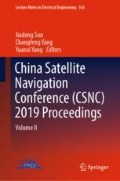Abstract
Inter-frequency clock bias (IFCB) should be considered when performing triple-frequency GNSS precise point positioning (PPP). Traditional approach of IFCB estimation is by averaging IFCB of all stations. However, this method doesn’t consider the variation of receiver IFCB, so the averaged receiver IFCB is lumped into satellite IFCB. If the receiver IFCB can’t eliminate by averaging when station number is limited, this method is not theoretical compactness. In this paper, we propose a more compactness IFCB estimation method based on network solution. In this method, the satellite and receiver IFCB are estimated together under a constraint of satellite IFCB. To validate this method, we select a 60-days global MGEX data and estimate the BDS IFCB between B1B2 and B1B3. Results show that BDS IFCB is within 10 cm and the RMS for all satellites are within 3 cm, while for receiver IFCB, it has a similar periodic performance as satellite. After correcting IFCB in kinematic PPP using B1B3 combination, statistical results among 13 MGEX stations show about 0.5 cm improvement in horizontal and vertical comparing with uncorrected IFCB PPP solution.
Access this chapter
Tax calculation will be finalised at checkout
Purchases are for personal use only
References
Cao X, Li J, Zhang S et al (2018) Uncombined precise point positioning with triple-frequency GNSS signals. Adv Space Res, S0273117718302515
Ge Y, Zhou F, Sun B et al (2017) The impact of satellite time group delay and inter-frequency differential code bias corrections on multi-GNSS combined positioning. Sensors 17(3):602
Geng J, Bock Y (2013) Erratum to: triple-frequency GPS precise point positioning with rapid ambiguity resolution. J Geodesy 87(5):449–460
Li H, Wu B, Zhou X (2013a) Fast estimation and analysis of the inter-frequency clock bias for the Block IIF satellites. GPS Solutions 17(3):347–355
Li H, Chen Y, Wu B et al (2013b) Modeling and initial assessment of the inter-frequency clock bias for COMPASS GEO satellites. Adv Space Res 51(12):2277–2284
Li H, Li B, Xiao G, Wang J, Xu T (2016) Improved method for estimating the inter-frequency satellite clock bias of triple-frequency GPS. GPS Solut 20:751–760
Li HJ, Zhou XH, Wu B et al (2012) Estimation of the inter-frequency clock bias for the satellites of PRN25 and PRN01. Sci China: Phys Mech Astron 55(11):2186–2193
Mohamed E (2015) Precise point positioning using triple-frequency GPS measurements. J Navig 68(3):13
Montenbruck O, Hugentobler U, Dach R, Steigenberger P, Hauschild A (2012) Apparent clock variations of the Block IIF-1 (SVN62) GPS satellite. GPS Solut 16:303–313
Montenbruck O, Steigenberger P, Hauschild A (2018) Multi-GNSS signal-in-space range error assessment – methodology and results. Adv Space Res, S0273117718302813
Pan L, Zhang X, Liu J et al (2016) Analysis and correction of the inter-frequency clock bias for BeiDou satellites. In: China Satellite Navigation Conference (CSNC) 2016 Proceedings: Volume II. Springer Singapore
Pan L, Zhang X, Li X et al (2018) GPS inter-frequency clock bias modeling and prediction for real-time precise point positioning. GPS Solut 22(3):76
Acknowledgement
This work is support by the National Natural Science Foundation of China (No. 41874042) and the Opening Project of Shanghai Key Laboratory of Space Navigation and Positioning Techniques (No. KFKT_201706).
Author information
Authors and Affiliations
Corresponding author
Editor information
Editors and Affiliations
Rights and permissions
Copyright information
© 2019 Springer Nature Singapore Pte Ltd.
About this paper
Cite this paper
Zhang, Y., Kubo, N., Chen, J., Wang, H., Wang, J. (2019). An Improved Method for BDS Inter-frequency Clock Bias Estimation. In: Sun, J., Yang, C., Yang, Y. (eds) China Satellite Navigation Conference (CSNC) 2019 Proceedings. CSNC 2019. Lecture Notes in Electrical Engineering, vol 563. Springer, Singapore. https://doi.org/10.1007/978-981-13-7759-4_4
Download citation
DOI: https://doi.org/10.1007/978-981-13-7759-4_4
Published:
Publisher Name: Springer, Singapore
Print ISBN: 978-981-13-7758-7
Online ISBN: 978-981-13-7759-4
eBook Packages: EngineeringEngineering (R0)

